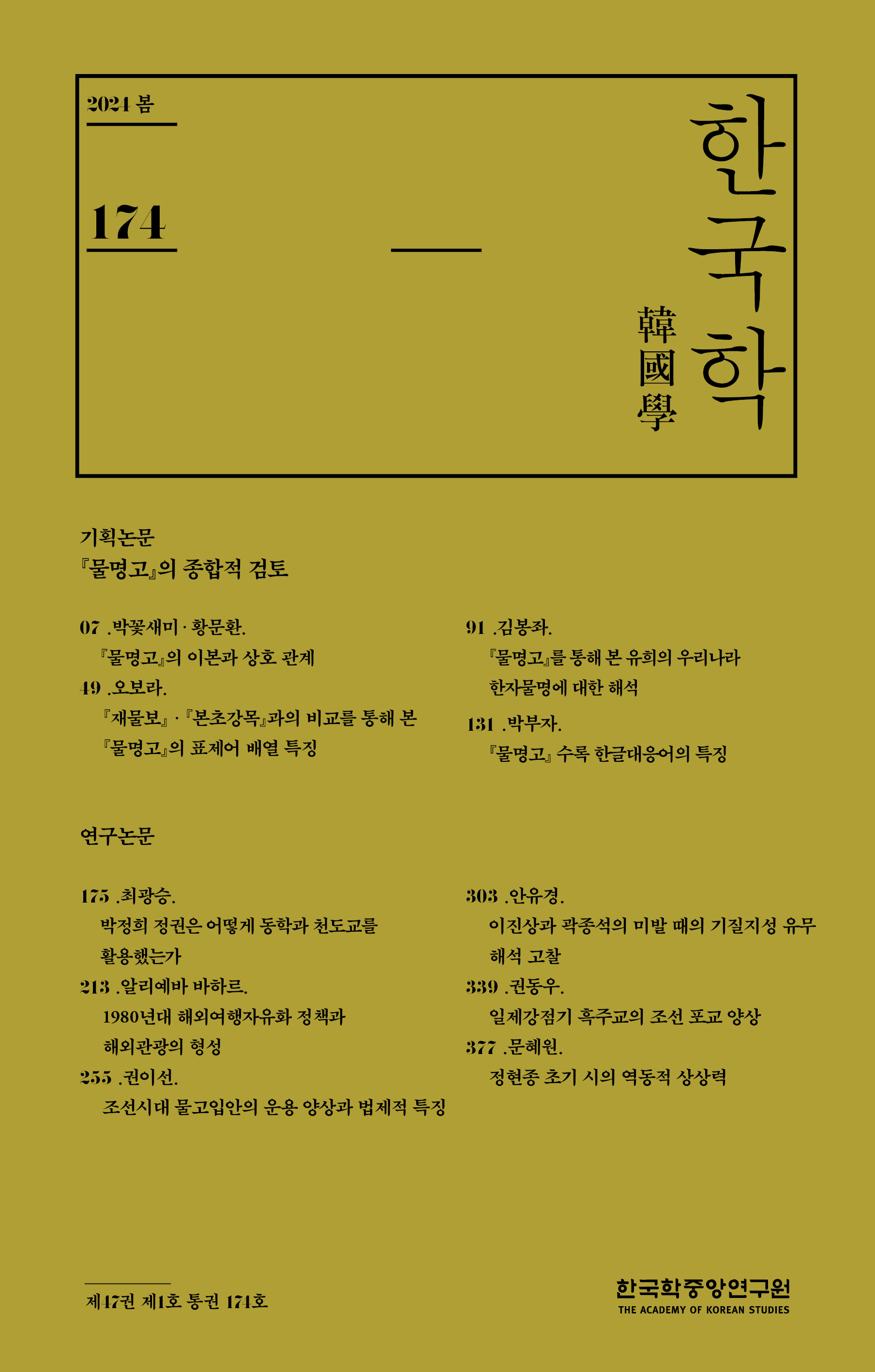
- P-ISSN 2671-8197
- E-ISSN 2733-936X
홍문관은 사헌부・사간원과 함께 언론 삼사로 꼽혔으며 조선시대 정치제도사에서 매우 중요한 위상을 지닌 관서였다. 필자는 ‘조선시대 홍문록(弘文錄)과 집권세력의 네트워크’라는 연구 주제를 공유하는 가운데, 이를 조선 후기 역사의 흐름 위에서 구명하기 위해 영․정조 연간에 추진된 이조낭선 개혁 개혁과 홍문관의 위상 변화에 주목했다. 우선 홍문록의 기록을 근거로 하여 각 시기별로 정국을 주도했던 주요 관료의 출사 연원과 실제 행보를 파악하고, 그로부터 각 정파 혹은 군신 간의 관계를 개연성 있게 설명할 근거를 찾아보았다. 아울러 탕평의 기조를 부식하고 왕권의 신장을 모색하는 방편으로 시행된 이조낭선 개혁이 홍문관의 권한과 위상에 어떠한 영향을 주었는지를 분석하는 데 집중했다. 이러한 고찰의 결과 환국을 통한 특정 정파의 집권 과정에서 홍문관을 통한 붕당의 재생산 구조가 신속히 구축되었음을 확인했으며, 이러한 절차를 통해 기용된 인사들이 반대파에 대한 논핵과 자파의 세력 기반 확장에 적극 참여했음을 알 수 있었다. 아울러 홍문록 인사가 노소에게 번갈아 독점됨으로써 홍문관이 자파의 당론을 두둔하는 언관의 재생산 창구로 활용되고, 붕당 간 대립이 격화되는 한 계기로 비화함에 따라 홍문관에 대한 영조의 인식도 악화되기 시작했음을 확인했다. 영조는 권력의 견제 수단으로서 홍문관에 부여된 특권이 오히려 당론을 비호하는 수단으로 전락하고 말았다고 인식했으며, 이로 인해 홍문관을 비롯한 언관 인선 방식을 개혁해야 할 당위성을 느끼게 되었다. 실제 이 시기 단행된 이조낭선 개혁의 큰 흐름과 연동하여 보았을 때 홍문관원 인선 방식에도 유의미한 변화가 발생했으며, 이를 통해 기타 관서와의 교류 양상 및 홍문관의 위상에도 전과 다른 변화가 나타나게 되었음을 엿볼 수 있다. 다만, 영조의 치세 내에 홍문관원 선발 방식 자체가 크게 개정된 내용은 눈에 띄지 않는다. 이처럼 영조 연간 홍문관의 인사제도가 고유의 특성과 권한을 거의 그대로 유지했던 것은, 홍문관이 정치세력을 재생산하는 연원임과 동시에 우문 정치의 조력자로서 왕권을 뒷받침하는 장치이기도 했기 때문으로 판단된다.
Hongmun-gwan was a very important office in the history of political institutions in the Joseon Dynasty. This paper focuses on reforms in the selection system and the changing status of the Hongmun-gwan during the reigns of two Joseon kings, Yeongjo and Jeongjo. First, based on the Hongmunrok, I identified the process of entering the bureaucracy and the activities of key bureaucrats who led the government in each period, and sought evidence to explain the relationship between the political factions and the king and his subjects. I also focused on analyzing how reforms in the selection of remonstrance officials, which were implemented to increase royal power, affected the power and status of Hongmun-gwan. These findings reveal that during a particular political party’s rise to power, Hongmun-gwan quickly established a structure to consolidate the party’s power, and that those appointed through this process were actively engaged in discrediting opponents and expanding their own power base. Moreover, as Hongmun-gwan became a vehicle for intensifying partisan confrontation, Yeongjo’s perception of Hongmun-gwan began to deteriorate. Yeongjo perceived that the privileges granted to Hongmun-gwan as a check on his power had become a means of favoring partisan positions, and felt compelled to reform the entire system of remonstrance officials’ selection, including Hongmun- gwan. In fact, when viewed in conjunction with the extensive reforms to the selection system of remonstrance officials that took place during this period, there was a significant change in the way officials of Hongmun-gwan were selected. There was also a change in the way Hongmun-gwan interacted with other government offices and the status of the Hongmun-gwan. It is noteworthy that Hongmun-gwan’s personnel system itself was not significantly revised during the reign of Yeongjo. The fact that the personnel system of Hongmun-gwan remained largely unchanged during the reign of Yeongjo was due to the fact that Hongmun-gwan was not only a source of consolidating political power, but also a device to support royal power.